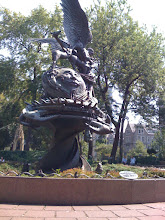The new Jewish month is upon us shortly. Adar rishon, or the first month of Adar, is a leap month, added into the calendar to keep it balanced out. I prepare differently for the month ahead than is typical. In fact, I typically let one month slide into the next with very little acknowledgement. But I will be spending three weeks of the coming month (actually within February and Adar) abroad, in Israel.
First of all, it’s the first time I’ll be in the country since Passover 2006. Every holiday since then, I’ve sung “b’shana haba’ah b’yerushaliyim” next year in Jerusalem. Here it is, returning to the country of prayers and there isn’t a holiday in sight. Not even a new month. How did I manage that?
Thinking about the odds, I looked back at the luach, the hebrew calendar and noticed there was *something* on it. Oh. I’ll be spending “purim katan” in Israel. You’ve never heard of it because it isn’t observed in any substantial way anymore. I mean if you’re searching, we are told not to fast on that day. And we are told not to eulogize, either. I know this because it marks the burial of my bubbe, my maternal grandmother.
Now, when my grieving mother was told this, she was already in avelut, in mourning, for her father who we had lost not six weeks before. That graveside funeral had so many words of love, honor, blessing, both impromptu and organized, that I’m certain they carried our family home and through the week of mourning, shiva. My bubbe hadn’t travelled with us that cool December day, but we recounted the memories to her as we visited her throughout shiva.
I also want to make it clear that my mother was not told this by some forceful rabbi, but by her paternal uncle, who served as our family Rabbi when we were assembling for these kinds of gatherings. He let her know that she could practice however she saw fit. But, if we’re speaking honestly here, my mother was emotionally raw from talking about the dead. She had been exhausted by the long drawn out process of saying goodbye to both of her parents.
My mother welcomed the invitation not to prepare another eulogy. It was another blessing for her. I called my great uncle Itzy, rabbi, and I asked what the halacha was. To check what the rules really were. He said, if a eulogy is given, it has been said if they are words of torah that is OK. I replied, so if i write a d’var torah, if i bring text and teach in her memory, that is OK? It was.
I hadn’t spoken about my grandfather at his funeral service, the voices were so prominent there, and i was still so heartbroken from having seen him in hospice in his final days, where he was but a shell of the man who outpaced me my whole life.
I don’t remember what teaching I brought in my grandmother’s memory. I have it in a journal somewhere - but whatever text I used, whomever I quoted or celebrated, when I ended with my bubbe’s advice, the words she’d said to me when we parted for as long as I can remember, she’d rest her cane somewhere so she had both hands free and say “Sheridan, be sure to grow this way (she’d widen her arms vertically) and not this way (horizontally)!” Since she continued saying this long after I turned 12 and stopped growing, I can only assume she meant towards the heavens, with Godly and goodly intentions, to strive for higher heights and not be dormant and unmoved. May we understand her blessing to me as a hope for all of us, to grow in the right ways.
As we returned to the limo, thawing out from the icy winter morning, my mother said to me, “I didn’t know she used to say that to you.” I had given her a new memory. Shared with her a private moment, let my mother see that sometimes my bubbe wasn’t a hardened heart, but had a sense of humor and bemusement.
Our relationships with the people we love the most are also always the most difficult. It is easy to turn off or turn away. And when the rabbis say “don’t eulogize” the were hoping to lessen the pain, to not ruin the joy. But in celebrating the people we love, we can create more joy.
I wonder if we should explore what our tradition should say about ‘minor’ holidays today, and how they impact our relationship with traditional Jewish protocol. I wonder if it doesn’t harden the heart to spend years claiming, ‘next year in Jerusalem’ only to find yourself there on a quiet sabbath. But then I realize, Jerusalem is like my grandmother, always sending you off with a smile, a sweet treat, the call to return. Don’t wait until next year. Celebrate the people and places you love right now.


No comments:
Post a Comment